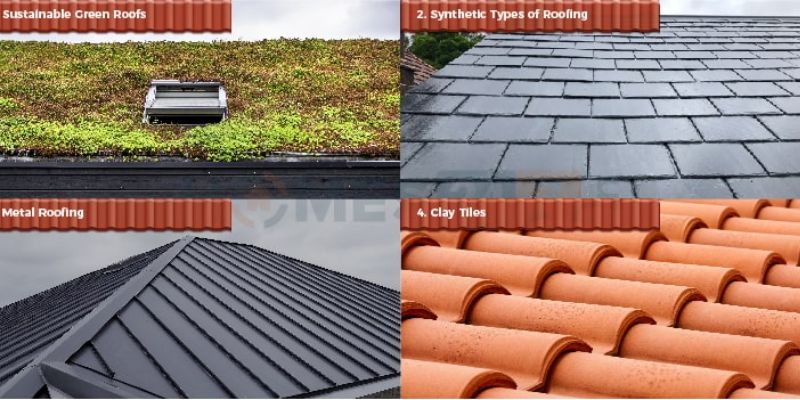Choosing the right roofing material is crucial when building or renovating a smart home. Advanced technologies that boost automation, connectivity, and energy efficiency are included in a smart home. As a result, the roofing materials that are used ought to be compatible with integrated systems, fit these smart features, and offer durability, insulation, and compatibility. “What Are the Different Types of Roofing Materials Used in Smart Homes?” will be the focus of this article, which will also highlight some of their most important features and benefits.
What Are the Different Types of Roofing Materials Used in Smart Homes?
Asphalt Shingles
Asphalt shingles are the most well-known and reasonable roofing material utilized in savvy homes. They provide a variety of advantages, including:
- An affordable option for budget-friendly smart homes
- Easy installation and maintenance
- Good resistance to fire and wind
- Available in various colors and styles
Metal Roofing
Metal roofing has gained popularity in smart homes due to its exceptional durability and energy efficiency. Key features of metal roofing include:
- Long lifespan, often exceeding 50 years
- Excellent resistance to fire, wind, and impact
- Reflective surface that reduces heat absorption
- Can be integrated with solar panels for sustainable energy production
Synthetic Roofing Materials
Synthetic roofing materials, such as rubber, plastic, or polymer, offer versatility and durability. Some notable synthetic options for smart homes include:
- Rubber roofing: Provides excellent waterproofing and insulation
- Plastic roofing: Lightweight and resistant to impact and UV radiation
- Polymer roofing: Mimics the appearance of other materials, like wood or slate
Clay Tiles
Clay tiles are a popular choice for smart homes aiming for a classic and elegant look. Here are some features of clay tiles:
- Natural and timeless aesthetic appeal
- Highly durable and resistant to fire, rot, and insects
- Excellent insulation properties for maintaining energy efficiency
- Available in various colors, shapes, and textures
Slate Roofing
Slate roofing is renowned for its durability and distinctive appearance. Consider these advantages when using slate in smart homes:
- Long lifespan, often exceeding a century
- Low maintenance requirements
- Resistant to fire, wind, and water
- Natural beauty that complements smart home aesthetics
Green Roofing
Green roofing has become increasingly popular in smart homes due to its environmental benefits and energy efficiency. Consider the following advantages:
- Natural insulation that reduces heating and cooling costs
- Stormwater management and improved air quality
- Aesthetic appeal with a range of plant and vegetation options
- Increased lifespan of the roofing structure
FAQs
FAQ 1: Can I install solar panels on different types of roofing materials used in smart homes?
Yes, solar panels can be installed on various roofing materials, including metal, asphalt shingles, and synthetic options. However, it is essential to consult with a professional to ensure the roofing material is compatible with solar panel installation.
FAQ 2: Are all roofing materials suitable for smart homes equipped with integrated technology?
Not all roofing materials are ideal for smart homes. Consider factors such as durability, insulation properties, and compatibility with integrated systems when selecting the roofing material for your smart home.
FAQ 3: Are there any roofing materials that can improve energy efficiency in smart homes?
Yes, metal roofing and green roofing options, such as vegetative roofs, can enhance energy efficiency in smart homes. Metal roofing reflects solar heat, while green roofs provide natural insulation.
FAQ 4: Do different roofing materials require specific maintenance in smart homes?
Yes, different roofing materials have varying maintenance requirements. Asphalt shingles may need periodic cleaning, while slate roofing requires occasional inspections for any damaged or displaced tiles. Consult the manufacturer’s recommendations for proper maintenance.
FAQ 5: Can I install a smart roof with integrated technology in any type of smart home?
Yes, smart roofs with integrated technology can be installed in various types of smart homes. However, it is essential to ensure compatibility between the smart roof and the existing or planned smart home systems.
FAQ 6: Are smart roofing materials more expensive than traditional options?
Smart roofing materials may have a higher upfront cost than traditional options. However, the long-term benefits, such as energy savings, increased efficiency, and enhanced connectivity, often outweigh the initial investment.
Wrap Up
Choosing the right roofing material for your smart home is crucial for ensuring durability, energy efficiency, and compatibility with integrated technology. From traditional options like asphalt shingles and clay tiles to modern choices such as metal roofing and synthetic materials, there are numerous possibilities to explore.
Consider the unique needs and characteristics of your smart home to select the roofing material that best suits your requirements. Keep in mind the maintenance requirements, lifespan, and potential for integrating other smart features. With the right roofing material, your smart home will not only look stylish but also perform optimally in the modern era of connected living.


order cialis soft tabs – https://ciltadgn.com/ canadian no prescription pharmacy cialis Este enlace se abrirГЎ en una ventana nueva